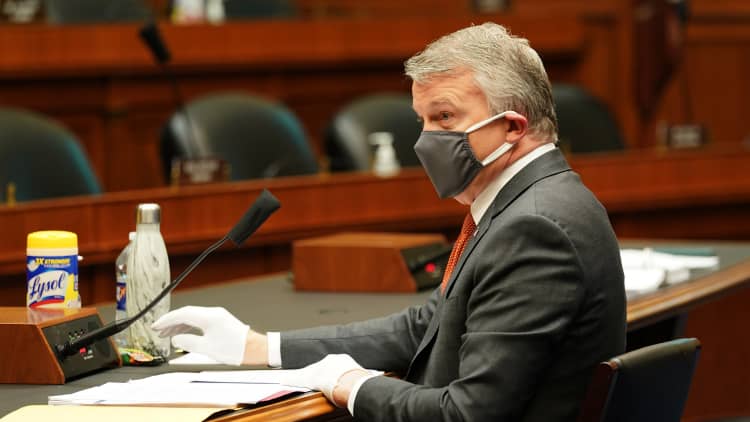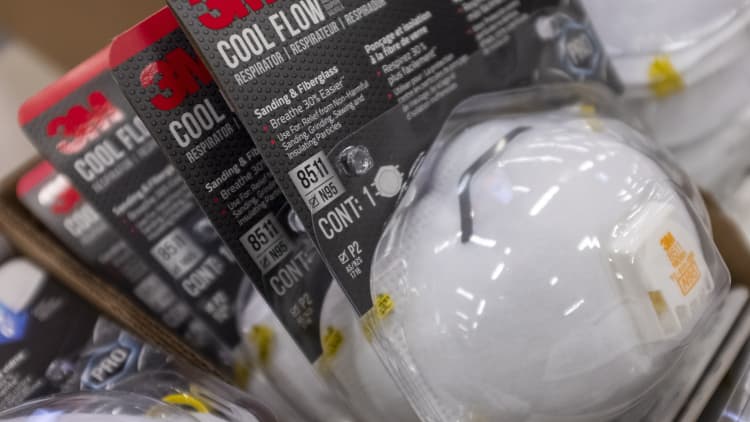
Rick Bright said he'll never forget the moment when he realized the coronavirus pandemic wreaking havoc in Asia would also become a crisis in the U.S.
"We're in deep s---. The world is, and we need to act," read the email he received from a top U.S. medical supplier.
Bright, who oversaw the U.S. Biomedical Advanced Research and Development Authority, was checking on the nation's supply of N95 masks. He immediately forwarded the email to his superiors at the U.S. Department of Health and Human Services, but no one responded, he said.
"From that moment on, I knew that we were going to have a crisis for our health-care workers because we were not taking action. We were already behind the ball," he testified before a House health subcommittee Thursday. "That was our last window of opportunity to turn on production to save the lives of our health-care workers, and we didn't act."
U.S. officials ignored Bright's warnings in January, refusing to ramp up mask production as shortages grew, said Bright, who was ousted from his position overseeing the U.S. vaccine program at BARDA. President Donald Trump finally invoked the Defense Production Act on April 2 to compel 3M, one of the top manufacturers of N95 masks in the U.S., to ramp up production.
"Lives were in danger, and I believe lives were lost," Bright said.
Bright said he told department leaders there would be a shortage of the critical supplies needed to protect health-care workers. The solution offered by HHS officials at the time was to change U.S. Centers for Disease Control and Prevention guidelines by advising the public against wearing medical-grade equipment to save the supply for health-care workers, he said.
"My response was, 'I cannot believe you can sit and say that with a straight face,'" Bright said.
To this day, Bright said doctors and nurses in the nation's hospitals are relying on N95 respirators that were procured in other countries but don't meet U.S. safety standards. The CDC reported in April that 27 health-care professionals had died due to Covid-19 since mid-February, according to data obtained by the department.
Medical professionals across the country have voiced concern about strained supplies of personal protective equipment, especially N95 respirators, which filter out 95% of very small particles, saying that they've had to reuse the same mask for weeks. However, Trump said that he's heard the nation has "tremendous supply to almost all places."
On Thursday, a senior administration official told reporters that the White House plans to ramp up the production of critical supplies and reexamine supply chains to replenish the nation's stockpile. Another senior administration official said the nation's stockpile of N95 respirators is expected to jump from 13 million to 300 million by the fall.
"When Covid broke out in the U.S., we had one to three weeks worth of supply for most of the items in our stockpile," the official, who declined to be named, told reporters on a call Thursday.
CDC officials initially dissuaded the public from buying masks, saying they primarily protected other people from infection, not the person who wears it, and were necessary for health-care workers. The agency didn't change its position until April 3, when it first recommended that the general public wear face coverings. The department still recommends that N95 masks be reserved for health-care workers, saying they shouldn't be shared or reused.
States have had to compete for medical supplies such as ventilators, masks and tests in international markets as a result of shortages. New York Gov. Andrew Cuomo said efforts to procure masks from China amid state competition for medical supplies were "inefficient and ineffective," saying the lack of medical equipment was a "national security issue."
— CNBC's Amanda Macias contributed to this report.




